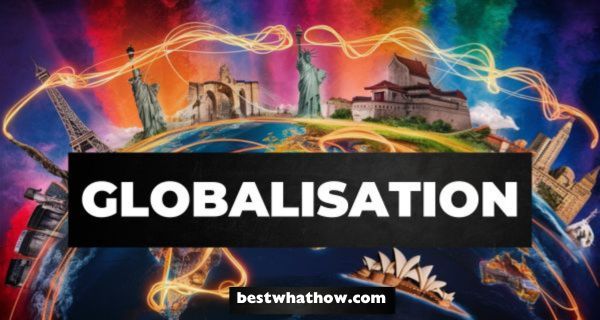Globalisation is the rapid integration or interconnection between countries mostly on the economic plane.
In other words, Globalisation means integrating our economy with the world economy. So, Globalisation is the interconnection between countries. Now let us see how countries are interconnected.
- MNCs are spreading their base and setting up factories or companies in other countries where labour is cheap.
- There is huge foreign investments and transfer of latest technology.
- Movement of people between countries increases due to globalisation.
The credit for globalisation rests entirely with MNCs. The investment made by these companies has raised the economic status of many developing countries. Foreign trade between countries has also risen rapidly. The activities of most MNCs involve trade in goods and also services.
Factors that enabled Globalisation
Factor 1 – Technology
Rapid improvement in technology has been one major factor that has stimulated the globalisation process.
(a) Transportation Technology
The dramatic improvement in transportation technology has played a vital role in faster delivery of goods across long distances at lower costs and in the movement of people from one country to another in a short time.
As the basis of globalisation is foreign trade and foreign investment (MNCs) movement of goods and people are vital for globalisation.
(b) Information and Communication Technology
Information and communication technology (or IT in short) has played a major role in spreading out production of services across countries. Many MNCs are service based companies therefore the transfer of information is very vital to them.
Computers, internet facilities, telegraph, telephones mobile phones, and fax are used to contact one another around the world, to access information instantly, and to communicate from remote areas. This has been facilitated by satellite communication devices.
Internet also allows us to send instant electronic mail (e-mail) and talk (voicemail) across the world at negligible costs.
Factor 2 – Liberalisation of Foreign Trade and Investment Policy
Liberalisation of foreign trade and investment policy is removing barriers or restrictions set by the government.
(a) Removing Trade Barriers
When the government on imports imposes tax, it is called a trade barrier. Governments use trade barriers to increase or decrease (regulate) foreign trade and to decide what kinds of goods and how much of each, should come into the country.
The Indian government, after Independence, had put barriers to foreign trade and foreign investment. This was considered necessary to protect the producers within the country from foreign competition.
During the end of the 20th century, India removed trade barriers and Indian producers were allowed to compete with producers around the globe.
(b) Liberalisation of Investment Policies
Barriers on foreign investment were also removed to a large extent enabling many
MNCs to set up their factories in India. Thus, the rapid improvement in technology and the liberalization of foreign policies paved the way for globalisation in India.
World Trade Organisation
- Location: Geneva, Switzerland
- Established: 1 January 1995
- Created by: Uruguay Round negotiations (1986-94)
- Membership: 164 countries on July 2016
- Budget: 220 million US$
- Secretariat staff: 625
- Head: Ngozi Okonjo-Iweala (Director-General)
World Trade Organisation (WTO) is an international body, which aims at liberalising international trade. It was started at the initiative of the developed countries.
➢ WTO establishes rules regarding international trade,
➢ It sees that the member countries obey these rules and 164 countries of the world are currently members of the WTO (2016).
o Administering WTO trade agreements.
o Forum for trade negotiations.
o Handling trade disputes.
o Monitoring national trade policies.
o Technical assistance and training for developing countries.
o Cooperation with other international organizations.
Positive Impact of Globalisation in India
The impact of globalisation in India has been tremendous.
- Greater competition among producers resulting from Globalisation is a great advantage to consumers as there is greater choice before them.
- Due to globalisation many MNCs have increased their investments in India. This means thousands of people are getting highly paid jobs and, enjoy much higher standards of living than was possible earlier.
- Local companies supplying raw materials, to these industries have prospered.
- Top Indian Companies have benefit from increased competition. They have invested in newer technology and production methods and raised their production standards.
- Some Indian companies have gained from successful collaborations with foreign companies.
- Large Indian companies have emerged as multinationals like Tata Motors.
- Globalisation has also created new opportunities for Indian companies providing services, particularly in the IT field. This has generated thousands of jobs.
Negative Impact of Globalisation in India
There is also a negative side to globalisation in India. For a large number of small producers and workers globalisation has posed major challenges.
Let us look into reasons for this negative impact:
Rising Competition
Liberalisation of Foreign Trade policies allowed the import of electronic goods at a very cheap cost. Local producers of electronic goods were not able to meet with this challenge.
MNCs flooded the market with quality products at a cheap price. Local producers are not able to compete with this and are put to hardship, as their goods do not have a market.
Uncertain Employment
In order to compete in the world market exporters, try and cut labour costs. Workers are denied their fair share of benefits as manufacturers are always on the lookout for cheaper labour.
The Struggle for a Fair Globalisation
As seen, globalisation has two sides – the positive and the negative. If a balance has to be brought about, we should strive towards fair globalisation.
On one hand we have people with education, skill and wealth who have benefited from globalisation, on the other hand, there are the uneducated, less skilled people who have not benefited from it.
The government can play a major role in ensuring that the fruits of globalisation reach everyone, the educated and the uneducated, equally. Its policies must protect the interests, not only of the rich and the powerful, but all the people in the country.
The Indian Government should ensure that…
- Labour laws are properly implemented, and the workers get their rights.
- The government should support small producers to improve their performance till the time they become strong enough to compete.
- If necessary, the government should use trade and investment barriers the protect small producers.
- The government should negotiate at the WTO for ‘fairer rules.
- It can also align with other developing countries with similar interests to fight against the domination of developed countries in the WTO.
Massive campaigns and representation by people’s organisations have influenced important decisions relating to trade and investments at the WTO. This has demonstrated that people also can play an important role in the struggle for fair globalisation.




















